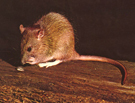‘Massive surge’ in UK rats and mice
A new report has found that rat and mouse populations are at extremely high levels following mild winters and good breeding conditions for the animals


A new report warns of a ‘massive surge’ in rat and mouse populations in the UK. The survey, from the National Pest Technician’s Association, says there were well over half a million complaints leading to rodent treatments in 2007/8 – by far the highest in the nine years of the report.
“Brown rats continue to be our most important national rodent pest,’ says NPTA survey co-ordinator Barrie Sheard. ‘They were responsible for nearly three quarters of all the local authority treatments we recorded in 2007/8.
This is one of the biggest rises ever recorded since their annual survey began, and the Association traces the surge in 2007/8 back to a failure to get on top of the populations the previous year and said that the mild winter of 2006/7 meant rats benefited from good early summer breeding conditions.
‘Unless local authorities, utilities and other businesses can find new ways of working together with householders to combat rats and mice through well-planned and co-ordinated professional treatment, we can only see our national rodent problem becoming progressively worse in the years ahead,’ added Mr Sheard.
To comment on this article, use the comment box below, or email us at clonews@ipcmedia.com. Read more about the countryside.
Exquisite houses, the beauty of Nature, and how to get the most from your life, straight to your inbox.
